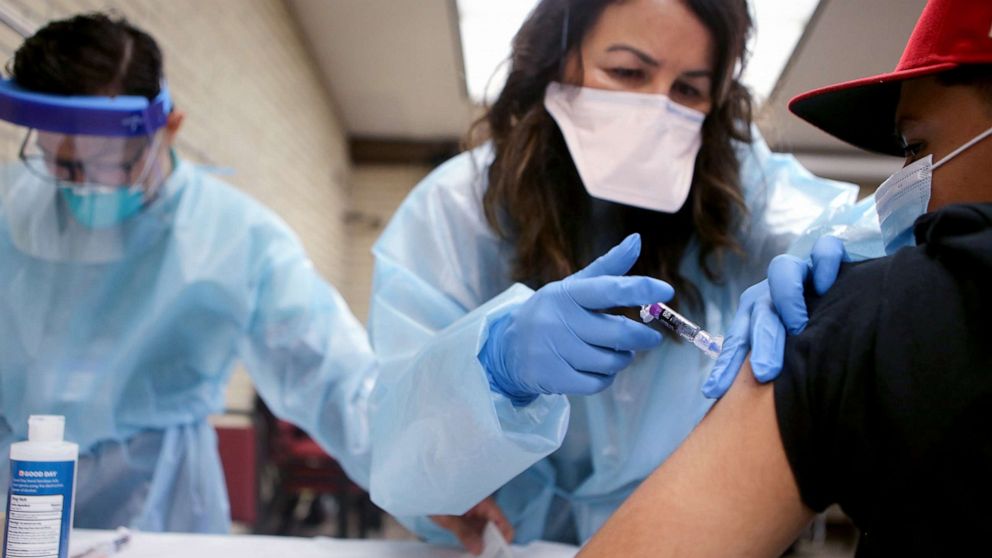今年早些时候注射过流感疫苗的人患严重流感的可能性较小新冠肺炎(新型冠状病毒肺炎)根据新的研究,未来的感染。
这项研究,发表在《公共科学图书馆·综合》杂志上周三,分析了来自美国、英国、意大利、德国、以色列和新加坡的7.47万多人的电子病历,这些人的新冠肺炎检测呈阳性。研究人员发现,那些在过去六个月中接种流感疫苗的人不太可能出现与新冠肺炎感染相关的健康并发症。
具体来说,研究人员发现,那些没有接种流感疫苗的人被送入重症监护室的可能性高达20%;到急诊室就诊的可能性高达58%;发生败血症的可能性高达45%;中风的可能性高达58%;与接种流感疫苗的人相比,患深静脉血栓的可能性增加40%。
研究人员没有发现接种流感疫苗和死于流感的可能性有任何联系新冠肺炎(新型冠状病毒肺炎)。

马里奥·塔玛/盖蒂图像,文件
在这张2020年10月14日的档案照片中,一名护士免费为一名年轻人注射流感疫苗...
这项新研究与之前的几项研究一致,这些研究发现了更好的新冠肺炎结果和流感疫苗注射之间的联系。之前的研究同样没有发现流感疫苗对新冠肺炎死亡有任何保护作用。
重要的是,注射流感疫苗与改善新冠肺炎结果的联系并不一定意味着它对新型冠状病毒有保护作用。虽然注射流感疫苗有可能增强免疫力,但选择注射流感疫苗的人总体上可能比不注射的人更健康,这意味着他们患新冠肺炎并发症的风险已经更低。
此外,流感疫苗在每个流感季节都有变化,因此不清楚为2020-2021年流感季节开发的疫苗是否会像2019-2020年疫苗那样与不太严重的新冠肺炎有同样的联系。
电子病历的另一个关键限制是,不同国家可能会以不同的方式报告症状,并使用不同的诊断测试来确认新型冠状病毒诊断,这可能会扭曲数据。
尽管还需要更多的研究,研究作者指出,“考虑到新型冠状病毒疫苗不能传递完全免疫,即使是已经接受新型冠状病毒疫苗接种的患者也可能受益。”
Flu shot linked to less severe COVID-19: Study
People who got a flu shot earlier this year may be less likely to suffer a severeCOVID-19infection down the road, according to new research.
The study,published in the journal Plos Oneon Wednesday, analyzed the electronic medical records of more than 74,700 people from the United States, the United Kingdom, Italy, Germany, Israel and Singapore, who tested positive for COVID-19. Researchers found that those who had gotten the flu vaccine during the previous six months were less likely to have had health complications related to their COVID-19 infection.
Specifically, researchers found that those who didn't get flu shots were up to 20% more likely to be admitted to the ICU; up to 58% more likely to visit the emergency room; up to 45% more likely to develop sepsis; up to 58% more likely to have a stroke; and 40% more likely to develop deep vein thrombosis, compared with those vaccinated against the flu.
Researchers didn't find any connection between receiving a flu shot and being less likely to die fromCOVID-19.
The new research is in line with several previous studies that found links between better COVID-19 outcomes and flu shots. That prior research similarly didn't find the flu vaccine offered any protection against COVID-19 death.
Importantly, the flu shot's link to better COVID-19 outcomes doesn't necessarily mean it's protective against the novel coronavirus. While it's possible that the flu shot boosts immunity, it's also possible that people who opt to get the flu shot tend to be healthier overall than people who skip it, meaning they're already at lower risk for COVID-19 complications.
Additionally, the flu shot changes every flu season, so it's unclear whether the vaccine developed for the 2020-2021 flu season would have the same link to less severe COVID-19 that the 2019-2020 vaccine did.
Another key limitation with electronic medical records is that different countries may report symptoms differently and use different diagnostic tests to confirm SARS-CoV-2 diagnoses, which could skew the data.
While more research is needed, the study authors noted, "Even patients who have already received SARS-CoV-2 vaccination may stand to benefit given that the SARS-CoV-2 vaccine does not convey complete immunity."






